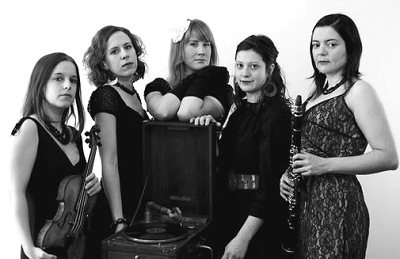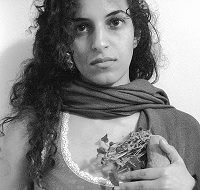Continuing a theme: earlier this week I mentioned a gig by composer Matt McBane’s “not-quite-neo-alt-rock-chamber-folk-etc” ensemble Build. The pattern continues this Sunday at The Stone in NYC (corner of 2nd street and Ave. C, $10), when two more “NQNARCFE” groups show us what they’ve got (is this the true wave of classical music’s future? — composers and performers each with their own group playing clubs? To try both sides of the pie, since our own side’s filling is getting decidedly skimpy?).

At 10pm Victoire takes the stage: “Brooklyn-based band founded by composer Missy Mazzoli (keyboards and compositions, with Olivia De Prato and Andie Springer, violins, Eileen Mack, clarinet, Lorna Krier, keyboards and Eleonore Oppenheim, double bass) has been dubbed an ‘all-star, all-female quintet’ by Time Out New York. This quirky ensemble combines strings, clarinets, keyboards and lo-fi electronics (including samples of sewing machines and answering machine tapes) to create their ‘minimalist, post-rock bliss’.” Their EP has been getting a great reception, and chances are good that you’re going to hear about them far into the future.

Opening the night at 8pm, Odeya Nini stamps her own group with a rather different vibe. As Odeya tells me herself, “...my current work is a bit different – I guess its just a piling up of more experiences, mind tumbles and turns. My music could be categorized as indie chamber / electronic / folk — or simple music for folks to focus and indulge in what they might perceive as cohesive or opaque.”
Odeya “received her BFA in vocal performance from the New School for Jazz and Contemporary Music where she studied voice with Theo Bleckmann and composition with Kirk Nurock and Gerry Hemingway. Today her work is characterized by skillful experimentation, integrating improvisation, acoustic composition and electro-acoustic sounds to create thought provoking works of art.”
She’ll be working with her own group of sidekicks : Alex Hills (piano), James Ilgenfritz (bass), Jake Wise (clarinet), Katie Young (bassoon), Elena Moon Park (violin) and Curtis Stewart (violin). This is one of Odeya’s last gigs in NYC before she relocates out West for grad school composition study.

I guess I never really considered starting a band… But reading this makes me think it might not be such a bad idea.
forming a ‘band’ isn’t really new or groundbreaking, but its still is the most fun you can have with your clothes on.
I think that’s a great point too, Jake. Perhaps it’s just illustrative of what happens when anyone is effectively shut out from what passes for the ‘mainstream’. If we don’t want to just bag the whole thing, the art’s got to get out there any way we can do it. We can whine about unfairness, but that’s generally the least effective agent of change. Meanwhile, life’s too short and there’s only so much time to get the music made. Use any means you can, bring it to any who’ll accept it, and hopefully the slow tide of acceptance will chip away at that mainstream monolith.
Great point, Steve, about the distinction between what is written for ensembles with and without the composer. Of course, the potential 8-Hundred-Pound Gorilla in the room is the expansive tradition of African-American Experimental Composers writing for ensembles that include them as performers, and also ones that don’t: Scott Joplin, Duke Ellington, Charlie Parker (He wanted to study with Varese too!), Max Roach, Ornette Coleman, Anthonty Braxton, George Lewis, Anthony Davis, etc.
These names don’t come up too too much in discussion of Contemporary Western Art Music…but when the discussion turns to experimental performer/composers and the type of post-modern code switching of people like Rhys Chatham and others, it’s becomes even more crystal clear where, perhaps, the most significant historical precedence lies.
What is a little different is the “band” nature of the groups. A more apt example of a forerunner might be Frank Zappa. Often, the music the ‘band’ plays might be a bit different from what the composer writes for other, more traditional ensembles. There are a lot of them though, where the material in the band is identical; besides your examples, Jake, I can think of people as varied as Paul Bailey, any of folk in what was the Cartesian Reunion Memorial Orchestra, Robert Ashley, Rhys Chatham, Elliott Miles McKinley, QQQ, Corey Dargel, Erik Spangler/DJ Dubble8, Polly Moller/Reconnaissance Fly… Certain composers too, like Alvin Curran, Pauline Oliveros — even myself, come to think of it! — have concentrated on a body of work that focuses on themselves as performer/interpreter.
Composer led ensembles are nothing new. On the contrary they’ve defined the history of Contemporary Western Art Music. I won’t take it as far back as Rimsky-Korsakov and his own personal workshop orchestra in St. Petersburg…but there’s 20th century examples in abundance:
Pierre Boulez – Domaine Musicale
Steve Reich – Steve Reich Ensemble
Philip Glass – Philip Glass Ensemble
Beat Furrer – Klangforum Wien
Grisey/Murail – L’Itineraire
Lucier/Tenney/Etc. – Sonic Arts Union
And that’s just the beginning…this is how all of these guys got their (incredibly demanding) music performed at a high level and on the map….onward and upward to all young composers!
I think more than anything, this sense of relying on one’s self to create one’s opportunities is the norm now for younger musicians (or musicians of younger spirit). With composers leading their own groups, composer-centric labels willing to record and promote said groups, and composers seeking out their audience in non-traditional ways (playing in clubs, blogging, social media, various funding models, etc.) I think few musicians of today seem to be waiting for Carnegie Hall or the NY Phil or even Bang on a Can to call them. Certainly if those more traditional opportunities came along, many would take them but there isn’t a reliance or an expectation or really, even a hope for them. We are just “doin’ for ourselves”.
“is this the true wave of classical music’s future?”
I don’t know about the future, but I think it’s a pretty good wave for composers to be riding now.
I started formulating the ideas for Build a few years ago and we started playing together in late 2007. It has since become the most rewarding musical endeavor of my life, and I have learned so much about my own music by taking it far past just producing a score to performing pieces dozens of times in wildly differing situations, memorizing them, recording and mixing them, hearing them on the radio, etc. Before I got into all that, I had no idea how much deeper you can get into your own music beyond the first step of writing it.
Composer-led bands/ensembles also allow the audience to get a much better understanding of a composer’s music than more traditional new music ensemble set-ups. I know that hearing Missy Mazzoli’s Victoire or Ken Thompson’s Slow/Fast (to name two of my favorite examples) in concert and on recording has allowed me to delve much deeper into the worlds of these two composers than hearing a single piece of theirs’ on a mixed repertoire concert by a new music ensemble ever could.
I really think a composer-led band/ensemble is one of the most viable ways for a composer to get her music out there and develop an audience for their work. Before I formed Build, one of the biggest problems I had was sustaining a relationship with an audience. For the most part, audience members would hear a piece of mine on a concert without any understanding of where it fell in the rest of my body of work. These experiences felt fairly shallow, like only going on first dates or something. Now I have people I don’t know write me saying how they listened to the Build CD “three times in a row on the way back to LA” or whatever and what they thought and felt about the different pieces. All in all this feels like a more fully developed relationship and is much more rewarding.